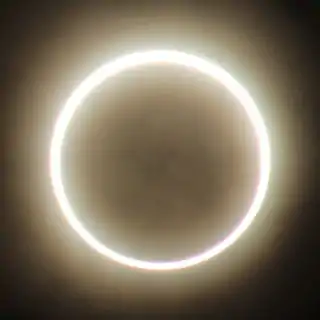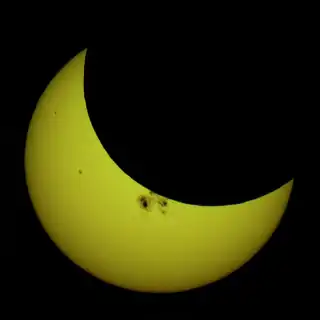Solar eclipse of June 13, 2132
A total solar eclipse will occur at the Moon's ascending node of the orbit on June 13, 2132. A solar eclipse occurs when the Moon passes between Earth and the Sun, thereby totally or partly obscuring the image of the Sun for a viewer on Earth. A total solar eclipse occurs when the Moon's apparent diameter is larger than the Sun's, blocking all direct sunlight, turning day into darkness. Totality occurs in a narrow path across Earth's surface, with the partial solar eclipse visible over a surrounding region thousands of kilometres wide. This is one of the solar eclipses occurring on Friday the 13th.
| Solar eclipse of June 13, 2132 | |
|---|---|
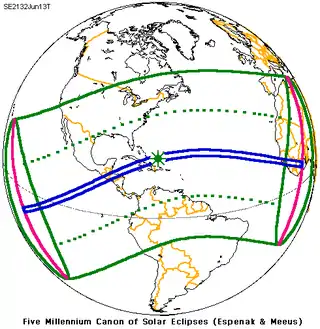 Map | |
| Type of eclipse | |
| Nature | Total |
| Gamma | -0.06 |
| Magnitude | 1.0788 |
| Maximum eclipse | |
| Duration | 415 sec (6 m 55 s) |
| Coordinates | 22.3°N 70.1°W |
| Max. width of band | 255 km (158 mi) |
| Times (UTC) | |
| Greatest eclipse | 16:46:24 |
| References | |
| Saros | 139 (36 of 71) |
| Catalog # (SE5000) | 9805 |
Duration
Lasting a maximum of 6 minutes, 55.02 seconds, it will be the longest solar eclipse since the solar eclipse of July 11, 1991, which lasted for 6 minutes 53.08 seconds. At sunrise totality will last 3 minutes 8.2 seconds and at sunset totality will last 3 minutes 7.3 seconds.
Related eclipses
Saros 139
It is a part of saros series 139, repeating every 18 years, 11 days, 8 hours, containing 71 events. The series started with partial solar eclipse on May 17, 1501. It contains hybrid eclipses on August 11, 1627 through to December 9, 1825 and total eclipses from December 21, 1843 through to March 26, 2601. The series ends at member 71 as a partial eclipse on July 3, 2763. Its eclipses are entabulated in three columns; each one in the same column, every third eclipse, is one exeligmos apart so cast shadows over approximately the same parts of the earth.
The solar eclipse of June 13, 2132 will be the longest total solar eclipse since July 11, 1991 at 6 minutes, 55.02 seconds.
The longest duration of totality will be produced by member 39 at 7 minutes, 29.22 seconds on July 16, 2186.[1] After that date each duration will decrease, until the series end. This date is the longest solar eclipse computed between 4000BC and 6000AD.[2] Saros series eclipses are during the Moon’s ascending node (a term related to our equator and polar-naming conventions).
| Series members 24–45 occur between 1901 and 2300 | ||
|---|---|---|
| 24 | 25 | 26 |
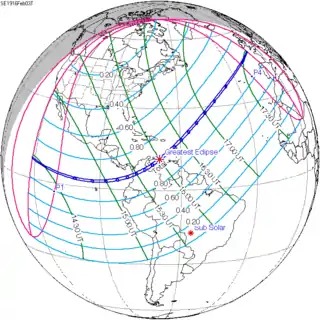 February 3, 1916 |
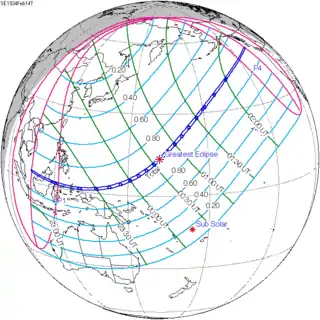 February 14, 1934 |
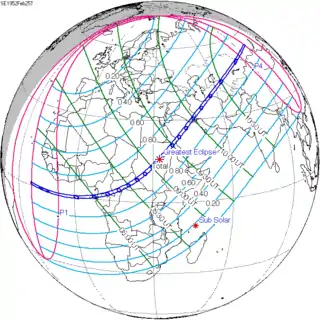 February 25, 1952 |
| 27 | 28 | 29 |
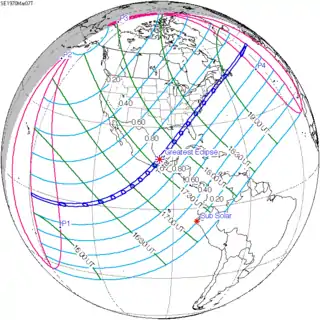 March 7, 1970 |
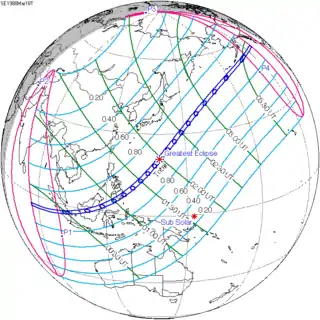 March 18, 1988 |
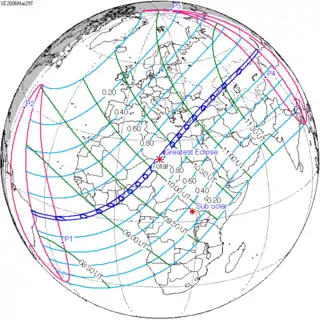 March 29, 2006 |
| 30 | 31 | 32 |
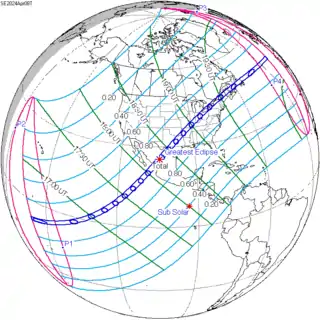 April 8, 2024 |
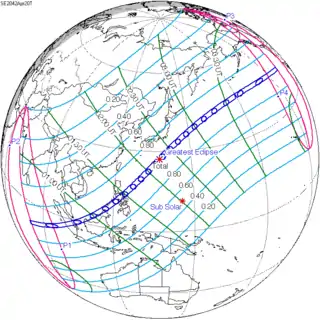 April 20, 2042 |
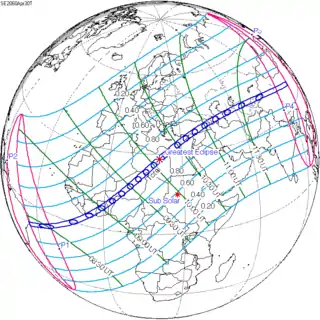 April 30, 2060 |
| 33 | 34 | 35 |
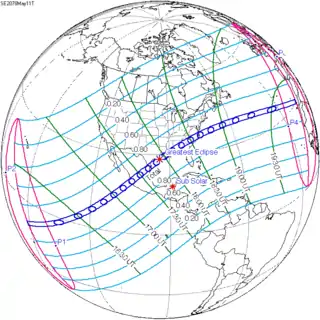 May 11, 2078 |
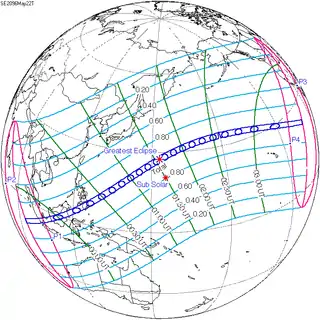 May 22, 2096 |
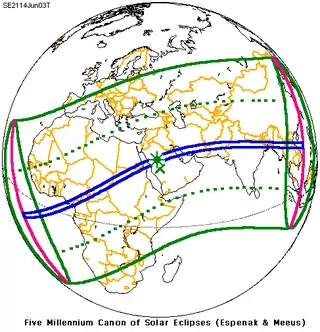 June 3, 2114 |
| 36 | 37 | 38 |
 June 13, 2132 |
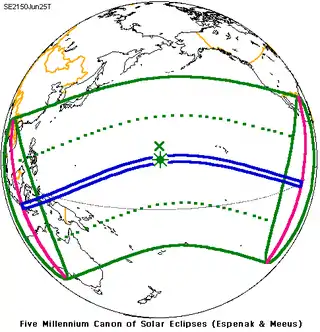 June 25, 2150 |
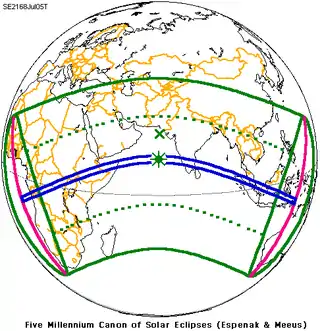 July 5, 2168 |
| 39 | 40 | 41 |
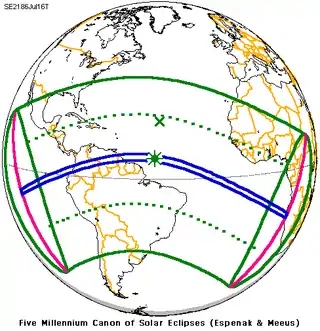 July 16, 2186 |
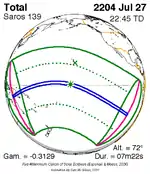 July 27, 2204 |
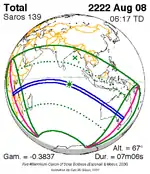 August 8, 2222 |
| 42 | 43 | 44 |
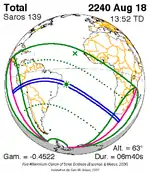 August 18, 2240 |
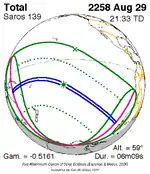 August 29, 2258 |
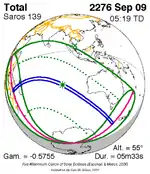 September 9, 2276 |
| 45 | ||
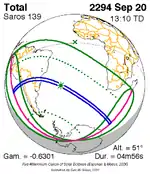 September 20, 2294 | ||
References
- Saros Series Catalog of Solar Eclipses NASA Eclipse Web Site.
- Ten Millennium Catalog of Long Solar Eclipses, -3999 to +6000 (4000 BCE to 6000 CE) Fred Espenak.
.jpg.webp)
